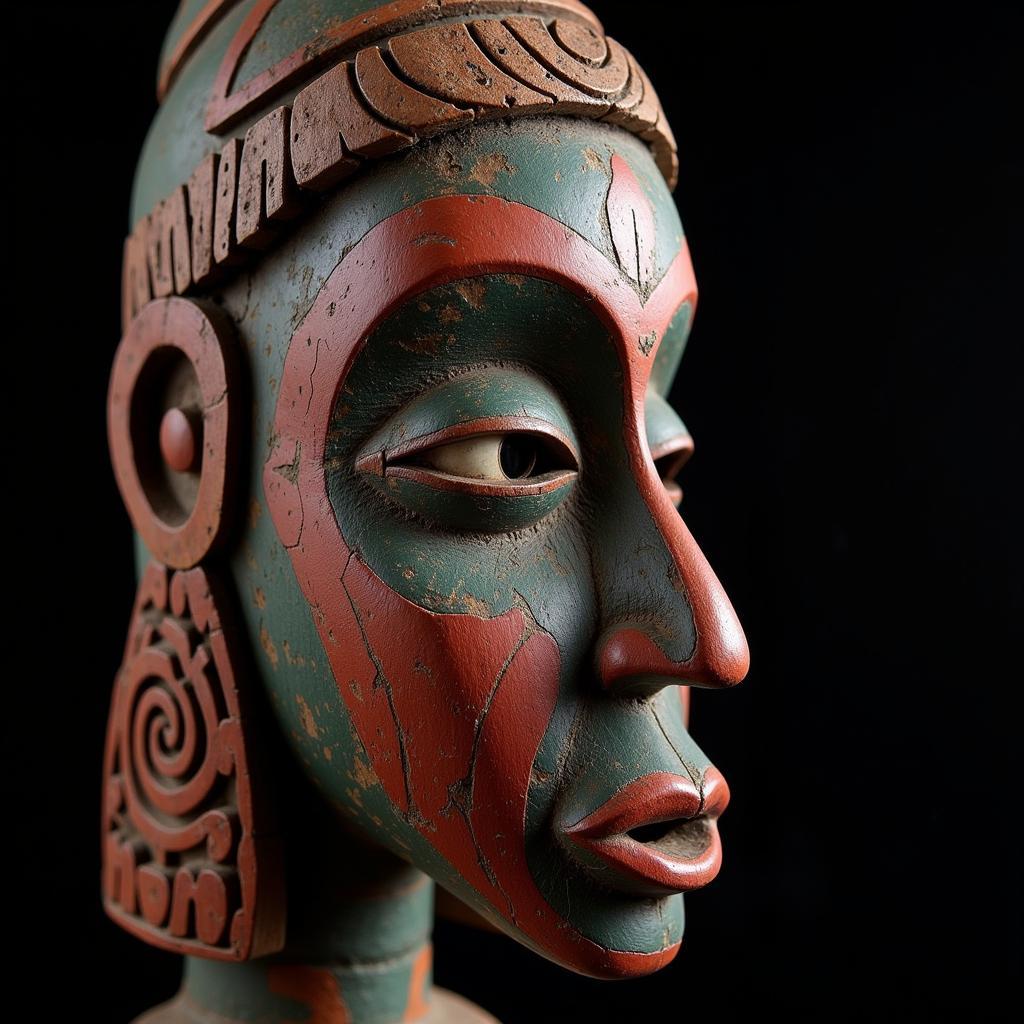The Ultimate Guide to the African Bullfrog Diet
The African Bullfrog Diet is a fascinating topic for both amphibian enthusiasts and nature lovers. These formidable predators boast a surprisingly diverse palate, consuming a variety of prey in their natural habitats. Let’s delve into the specifics of what these fascinating creatures eat and how their dietary habits contribute to their survival in the wild. You’ll see just how impressive the african bullfrog eating scary creatures can be. Check out this incredible footage of an african bullfrog eating chick! african bullfrog eating chick
What Does an African Bullfrog Eat?
African bullfrogs are opportunistic carnivores, meaning they will eat virtually anything they can overpower and swallow. Their diet includes a wide range of insects, rodents, reptiles, and even other amphibians. Their powerful jaws and broad mouths allow them to tackle prey much larger than one might expect.
Insects and Invertebrates
A significant portion of the African bullfrog diet consists of insects. Crickets, grasshoppers, locusts, and various beetle species are readily consumed. They also prey on other invertebrates such as scorpions, spiders, and earthworms.
Rodents and Small Mammals
African bullfrogs are known to consume small rodents like mice and even young rats. They are ambush predators, lying in wait for unsuspecting prey to wander within striking distance.
Reptiles and Amphibians
Lizards, snakes, and even other frogs are on the menu for these voracious amphibians. They’ve been observed consuming smaller frogs of different species, showcasing their dominance in their environment. It’s quite shocking to witness an african bullfrog eats frog. african bullfrog eats frog
What do African Bullfrogs Eat in Captivity?
In captivity, the African bullfrog diet needs careful management to ensure proper nutrition. A staple diet of crickets, supplemented with mealworms, roaches, and other insects, is typically recommended. Pinkie mice can be offered occasionally, but it’s crucial to avoid overfeeding, as obesity can be a problem. It’s essential to provide a varied diet to mimic the diversity they would experience in the wild.
The Hunting Techniques of the African Bullfrog
African bullfrogs are ambush predators, relying on camouflage and patience to capture their prey. They will bury themselves in the substrate, leaving only their eyes and nostrils exposed, and wait for unsuspecting creatures to approach. Once within range, they strike with incredible speed, using their powerful jaws to secure their meal.
How often should you feed an African Bullfrog?
The frequency of feeding depends on the age and size of the frog. Young frogs require more frequent feedings, sometimes daily, while adults can be fed every two to three days. It’s essential to monitor the frog’s weight and adjust feeding accordingly.
Dr. Anika Mali, a Herpetologist specializing in African amphibians, notes, “African bullfrogs are opportunistic hunters, and their diet reflects the availability of prey in their specific environment. Their adaptability is a key factor in their survival.”
Creating the Ideal Habitat for an African Bullfrog
A proper terrarium setup is crucial for the health and well-being of a captive African bullfrog. A spacious enclosure with a substrate that allows for burrowing is essential. A large water dish for soaking and a temperature gradient within the tank are also vital for mimicking their natural environment. You might want to explore options for an african bullfrog terrarium. african bullfrog terrarium
What are the common health problems associated with an improper diet?
An improper diet can lead to various health issues, including metabolic bone disease, obesity, and vitamin deficiencies. It’s crucial to consult with a veterinarian specializing in reptiles and amphibians to ensure your frog receives proper nutrition.
Dr. Kwame Nkosi, a veterinarian specializing in exotic animals, adds, “A balanced and varied diet is essential for the long-term health of captive African bullfrogs. Supplementation with calcium and other vitamins is often necessary to prevent deficiencies.”
Conclusion
The African bullfrog diet is a testament to this amphibian’s adaptability and resilience. Understanding their dietary needs is crucial for both appreciating their role in the ecosystem and ensuring their well-being in captivity. By providing a diverse and appropriate diet, we can help these fascinating creatures thrive. For additional information, you may be interested in learning about the african house snake for sale. african house snake for sale
FAQ
- What is the primary food source for African bullfrogs? Insects and invertebrates make up the bulk of their diet.
- Can African bullfrogs eat other frogs? Yes, they are known to consume other amphibians, including smaller frogs.
- How often should I feed my pet African bullfrog? Feeding frequency depends on age and size, but typically every two to three days for adults.
- What are the signs of an unhealthy African bullfrog diet? Lethargy, weight loss or gain, and skin problems can indicate dietary issues.
- What kind of substrate is best for an African bullfrog terrarium? A mix of coconut fiber and peat moss is a good option for burrowing.
- Can African bullfrogs eat fruits and vegetables? No, they are strictly carnivores and require a meat-based diet.
- How big can an African bullfrog get? They can grow up to 9 inches in length and weigh over 2 pounds.
More Questions and Further Reading
- What are the nutritional requirements for captive African bullfrogs?
- How can I tell if my African bullfrog is overweight or underweight?
- What are the signs of dehydration in African bullfrogs?
- Are there any poisonous insects I should avoid feeding my African bullfrog?
- What are the best practices for handling an African bullfrog?
For more information on African bullfrogs and other fascinating African wildlife, explore other articles on our website.
Need assistance? Contact us!
Phone: +255768904061
Email: kaka.mag@gmail.com
Address: Mbarali DC Mawindi, Kangaga, Tanzania.
Our customer service team is available 24/7.


